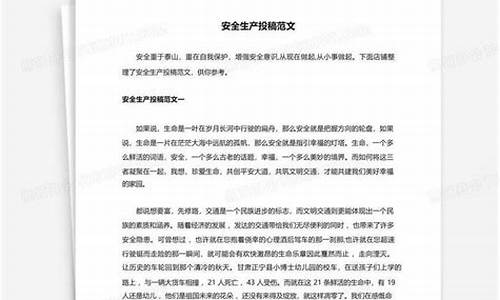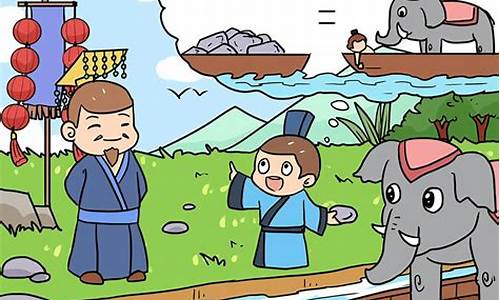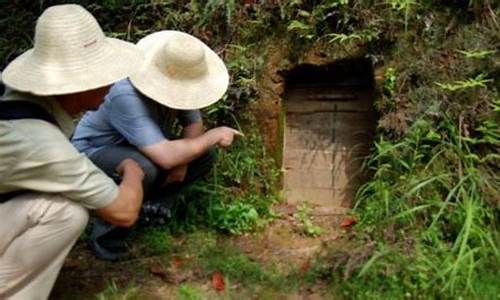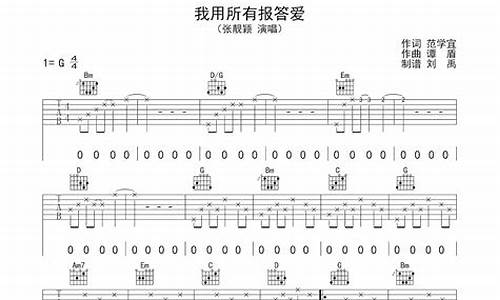您现在的位置是: 首页 > 分类作文 分类作文
小升初英语
zmhk 2024-05-11 人已围观
简介小升初英语 最近有些忙碌,今天终于有时间和大家聊一聊“小升初英语”的话题。如果你对这个话题还比较陌生,那么这篇文章就是为你而写的,让我们一起来探索其中
最近有些忙碌,今天终于有时间和大家聊一聊“小升初英语”的话题。如果你对这个话题还比较陌生,那么这篇文章就是为你而写的,让我们一起来探索其中的奥秘吧。
1.小升初英语语法知识点总结
2.小升初优秀英语作文赏析
3.小升初优秀英语作文范文五篇
4.小学英语小升初语法总结:祈使句,感叹句,疑问句
5.小升初英语必背知识点归纳
6.小升初英语单词分类大全(带音标)
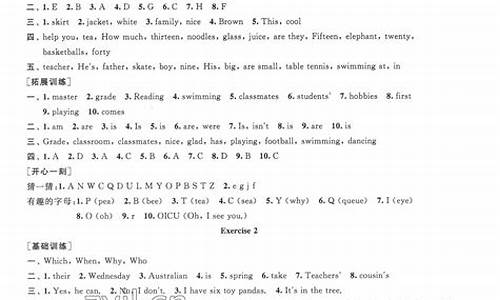
小升初英语语法知识点总结
#小学英语# 导语正确的语法可以简化信息,简单的一句话就能传达很多信息,甚至包含多重意思,就像双关语一样。语法正确还能避免歧义,明确指代关系和修饰对象等,是很有用的,学进去了就明白了。以下是 整理的《小升初英语语法知识点总结》相关资料,希望帮助到您。
篇一小升初英语语法知识点总结 (1) 指示代词 分单数和复数两种形式,既可作限定词又可做代词,例如:单数 复数
限定词:This girl is Mary. Those men are my teachers.
代词: This is Mary. Those are my teachers.
(2) 指示代词的句法功能;
a. 作主语
This is the way to do it.
这事儿就该这样做。
b. 作宾语
I like this better than that.
我喜欢这个甚至那个。
c. 作主语补语
My point is this.
我的观点就是如此。
d. 作介词宾语
I dont say no to that.
我并未拒绝那个。
There is no fear of that.
那并不可怕。
篇二小升初英语语法知识点总结
1.be动词的变化。肯定句:主语+be(am,is,are)+其它。如: I am a boy.我是一个男孩。
否定句:主语+ be + not +其它。如:He is not a worker.他不是工人。
一般疑问句:Be +主语+其它。 如:-Are you a student?-Yes. I am. / No, I'm not.
特殊疑问句:疑问词+一般疑问句。如:Where is my bike?
2. 行为动词的变化。
当主语为第一,二人称及复数时,助动词为do
肯定句:主语+动词原形(+其它)。如: We often play basketball after school.
否定句:主语+ don't+动词原形(+其它)。如:we don’t play basketball after school.
一般疑问句:Do +主语+动词原形+其它?
如: Do you often play basketball after school l? Yes, we do. / No, we don't.
特殊疑问句:疑问词+以do开头的一般疑问句?
如: What do you often do after school ?
当主语为第三人称单数时 ,助动词为does
肯定句:主语+动词三单式(+其它)。如: He swims well.
否定句:主语+ doesn’t+动词原形(+其它)。如:He doesn’t swim well..
一般疑问句:Does +主语+动词原形+其它。
如:Does he swim well ? Yes, he does. / No, he doesn't.
特殊疑问句:疑问词+以does开头的一般疑问句?
如: How does your father go to work?
三.第三人称单数的动词变化规则(只有在第三人称为主语的肯定句中,动词才用三单式)
(1)多数动词直接加s:runs gets likes collets takes plays climbs…….
(2)结尾是s, x, sh, ch, o,前为辅音字母,
结尾加es :watches teaches goes does washes crosses mixes brushes
(3)动词末尾y前为辅音:将y改为i加es: study→studies fly→flies carry→carries cry→cries
但在y前如果为元音则直接加s:buys says
篇三小升初英语语法知识点总结
感叹句通常有what, how引导,表示赞美、惊叹、喜 悦、等感情。what修饰名词,how 修饰形容词,副词或动词,感叹句结构主要有以下几种:
掌握它的搭配,即掌握了感叹句的重点。
How +形容词+ a +名词+ 陈述语序
How+形容词或副词+ 陈述语序
What +名词+ 陈述语序
What+a+形容词+名词+ 陈述语序
What+ 形容词+复数名词+ 陈述语序
What+ 形容词+不可数名词+ 陈述语序
How clever a boy he is!
How lovely the baby is!
What noise they are making!
What a clever boy he is!
What wonderful ideas !
What cold weather it is!
感叹句的省略形式为:
What a clever boy !
小升初优秀英语作文赏析
语法就是语言的规律。任何一种语言都有其内在逻辑性(logic)和规律(discipline)。学习一些基本的英语语法,对于快速掌握英语语言的规律,具有事半功倍的作用,尤其是在考试中。下面就是我为大家梳理归纳的内容,希望能够帮助到大家。小升初英语语法汇总
名词
可数名词和不可数名词
表示某一事物,有具体的和抽象的之分。分为可数名词和不可数名词。
强调:不可数名词都默认为单数,所以总是用is或者was;不要根据some、any、a lot of等词去作判断,以免受误导。
1、可数名词如何变“复数形式”:
a.一般情况下,直接加-s,如:book-books, bag-bags, cat-cats, bed-beds;
读音:清辅音后读[s],浊辅音和元音后读[z]。
b.以s. x. sh. ch结尾,加-es,如:bus-buses, box-boxes, brush-brushes, watch-watches;
读音:[iz]。
c.以“辅音字母+y”结尾,变y为i, 再加-es,如:family-families, strawberry-strawberries;
读音:[z]。
d.以“f或fe”结尾,变f或fe为v, 再加-es,如:knife-knives ,thief-thieves
读音:[z]。
e.以“o”结尾的词,分两种情况
1)有生命的+es 读音:[z] 如:mango-mangoes tomato-tomatoes hero-heroes
2) 无生命的+s 读音:[z] 如:photo-photos radio-radios
f. 不规则名词复数: man-men, woman-women, policeman-policemen, policewoman-policewomen, snowman-snowmen, mouse-mice, child-children, foot-feet, tooth-teeth, fish-fish, people-people, Chinese-Chinese, Japanese-Japanese
2、不可数名词没有复数。如果要计算不可数名词所表达的数量,就得在数词和不可数名词之间加上“量词+of”。
例如:a glass of water, a piece of paper, a bottle of juice
冠词
冠词是一种虚词,不能独立使用,通常放在名词的前面,分为“不定冠词”和“定冠词”两种。
1、不定冠词:a、an。
用在单数名词前,表示“一个,一件……”。an用在以元音“音素”开头的单词前。
如:an e-mail, an orange, an old man, an English watch, an hour
2、定冠词:the。用在单数或者复数名词前。the没有具体意思,有时翻译为这、那。
它的基本用法:
(1)用来表示特指某(些)人或某(些)事物。如:The map on the wall is new.
(2)表示说话者双方都知道的人或事物。如:Look at the picture, please.
(3)表示再次提到前面谈过的人或事物。如:This is a stamp. The stamp is beautiful.
(4)用在表示世界上独一无二的事物前。如:the sun太阳 the moon月亮 the earth地球
(5)用在由普通名词构成的专有名词前。如:the Great Wall长城
(6)用在江河、湖海等专有名词前。如:the Changjiang River长江
(7)此外,序数词、形容词级、乐器名称等词前面和一些习惯用语中一般都用定冠词the。
如:the first day, the best boy, play the piano, in the same class
数词
我们学过两类数次:基数词和序数词。
基数词用于表示数量多少,而基数词用于表示次序,常在日期中出现。区别:基数词前面没有“the”;序数词前一定要有“the”。
1、超过二十以上的两位数需要在个位和十位之间加上“-”。如:21 twenty-one
2、三位数以上的则需要在百位数后再加上and。如:101 a/one hundred and one
3、用基数词来修饰可数名词时,一定别忘了它的复数形式。如:十八个男孩 eighteen boys
4、用基数词修饰不可数名词时,如是复数,变它的量词为复数。如:两碗米饭 two bowls of rice
5、序数词一般加“th”,特殊的有:first, second, third, fifth, eighth, ninth, twelfth以及二十及二十以外的整十:twentieth, thirtieth, fortieth…
“第几十几”:前面整十不变,后面“几”改为序数词。如:88 eighty-eighth
小升初英语语法知识点
相互代词
1)相互代词只有each other和one another两个词组
他们表示句中动词所叙述的动作或感觉在涉及的各个对象之间是相互存在的
例如:
It is easy to see that the people of different cultures have always copied each other.
显而易见,不同 文化 的人总是相互借鉴的
2) 相互代词的句法功能:
a. 作动词宾语;
People should love one another. 人们应当彼此相爱。
b. 可作介词宾语;
Does bark, cocks crow, frogs croak to each other. 吠、鸡鸣、蛙儿对唱。
说明:传统语法认为,相互关系存在于两个人或物之间用each other, 存在于两个以上人和物之间用one another。现代英语中,两 组词 交替使用的实例也很多,例如:
He put all the books beside each other.
他把所有书并列摆放起来。
He put all the books beside one another.
他把所有书并列摆放起来。
Usually these small groups were independent of each other.
这些小团体通常是相互独立的。
c. 相互代词可加-'s构成所有格,例如:
The students borrowed each other's notes.
学生们互借笔记。
物主代词
1)物主代词既有表示所属的作用又有指代作用
例如:
John had cut his finger; apparently there was a broken glass on his desk.
约翰割破了手指,显而易见,他桌子上有个破玻璃杯。
物主代词有形容词性(my, your等)和名词性(mine, yours等)两种,形容词性的物主代词属于限定词。
名词性的物主代词在用法上相当于省略了中心名词的 --'s属格结构,例如:
Jack's cap 意为 The cap is Jack's.
His cap 意为 The cap is his.
2) 名词性物主代词的句法功能
a. 作主语,例如:
May I use your pen? Yours works better.
我可以用一用你的钢笔吗? 你的比我的好用。
b. 作宾语,例如:
I love my motherland as much as you love yours.
我爱我的祖国就像你爱你的祖国一样深。
c. 作介词宾语,例如:
Your should interpret what I said in my sense of the word, not in yours.
你应当按我所用的词义去解释我说的话,而不能按你自己的意义去解释。
d. 作主语补语,例如:
The life I have is yours. It's yours. It's yours. 我的生命属于你,属于你,属于你。
反身代词
1) 列表
I-myself
we-ourselves
you-yourself
you-yourselves
she-herself
he-himself
they-themselves
2)做宾语
a. 有些动词需有反身代词
absent, bathe, amuse, blame, dry, cut, enjoy, hurt, introduce, behave
We enjoyed ourselves very much last night.
我们昨晚玩得很开心
Please help yourself to some fish.
请你随便吃点鱼
b. 用于及物动词+宾语+介词
take pride in, be annoyed with, help oneself to sth.
I could not dress (myself) up at that time.
那个时候我不能打扮我自己
注:有些动词后不跟反身代词, get up, sit-down, stand up, wake up等。
Please sit down.
请坐
3) 作表语; 同位语
be oneself: I am not myself today.
我今天不舒服
The thing itself is not important.
事情本身并不重要
4) 在不强调的情况下,but, except, for 等介词后宾语用反身代词或人称代词宾格均可
如:
No one but myself (me) is hurt.
注意:
a. 反身代词本身不能单独作主语。
(错) Myself drove the car.
(对) I myself drove the car. 我自己开车。
b. 但在and, or, nor连接的并列主语中,第二个主语可用反身代词,特别是myself 作主语。
Charles and myself saw it.
小升初英语语法知识点汇总
一.名词:名词单复数,名词的格
(一)名词单复数
1.一般情况,直接加-s,如:book-books, bag-bags, cat-cats, bed-beds
2.以s. x. sh. ch结尾,加-es,如:bus-buses, box-boxes, brush-brushes, watch-watches
3.以“辅音字母+y”结尾,变y为i, 再加-es,如:family-families, strawberry-strawberries
4.以“f或fe”结尾,变f或fe为v, 再加-es,如:knife-knives
5.不规则名词复数:
man-men, woman-women, policeman-policemen, policewoman-policewomen, mouse-mice
child-children, foot-feet, tooth-teeth, fish-fish, people-people, Chinese-Chinese, Japanese-Japanese
不可数名词的复数就是原型: paper, juice, water, milk, rice, tea
(二)名词的格
(1) 有生命的东西的名词所有格:
a) 单数后加 ’s 如: Lucy’s ruler my father’s shirt
b) 以s 结尾的复数名词后加 ’如: his friends’ bags
c) 不以s 结尾的复数后加 ’s children’s shoes
? 并列名词中,如果把 ’s加在最后一个名词后,表示共有, 如:
Tom and Mike’s car 汤姆和迈克共有的小汽车
? 要表示所有物不是共有的,应分别在并列名词后加’s
Tom’s and Mike’s cars 汤姆和麦克各自的小汽车
(2)表示无生命东西的名词通常用“ of +名词”来表示所有关系:如:
a picture of the classroom a map of China
二.冠词:不定冠词,定冠词种类:
(1)不定冠词:a / an a unit / an uncle
元音开头的可数名词前用an :
an egg / an apple / an orange / an eraser / an answer / an ID card / an alarm clock / an actor / an actress /
an e-mail / an address / an event / an example / an opera / an houran old man / an interesting book / an
exciting sport / an action movie / an art lesson /
(2)定冠词:the the egg the plane
2. 用法:
定冠词的用法:
(1)特指某(些)人或某(些)物: The ruler is on the desk.
(2)复述上文提到的人或物:He has a sweater. The sweater is new.
(3)谈话双方都知道的人或物:The boys aren’t at school.
(4)在序数词前: John’s birthday is February the second.
(5)用于固定词组中: in the morning / afternoon / evening
不用冠词的情况:
(1)专有名词前:China is a big country.
(2)名词前有定语:this , that , my , your , some, any , no 等:
This is my baseball.
(3)复数名词表示一类人和事:Monkeys can’t swim. They are teachers.
(4)在节日,日期,月份,季节前:Today is Christmas Day. It’s Sunday.
(5)一日三餐前:We have breakfast at 6:30.
(6)球类 棋类运动前:They often play football after class. He plays chess at home.
_ 但乐器前要用定冠词:I play the guitar very well.
(7)学科名称前:My favorite subject is music.
(8)在称呼或头衔的名词前:This is Mr Li.
(9)固定词组中:at noon at night by bus
三、代词:人称代词,物主代词
人称代词 物主代词
主格 宾格
第一
人称 单数 I(我) me my(我的)
复数 we(我们) us our(我们的)
第二
人称 单数 you(你) you your(你的)
复数 you(你们) you your(你们的)
第三
人称 单数 he(他) him his(他的)
she(她) her her(她的)
it(它) it its(它的)
复数 they(他们/她们/它们) them their(他们的/她们的/它们的)
四、形容词,副词:比较级,级
(一)、形容词的比较级
1、形容词比较级在 句子 中的运用:两个事物或人的比较用比较级,比较级后面一般带有单词than。比较级前面可以用more, a
little来修饰表示程度。than后的人称代词用主格(口语中可用宾格)。
2.形容词加er的规则:
⑴ 一般在词尾加er ;
⑵ 以字母e 结尾,加r ;
⑶ 以一个元音字母和一个辅音字母结尾,应双写末尾的辅音字母,再加er ;
⑷ 以“辅音字母+y”结尾,先把y变i,再加er 。
3.不规则形容词比较级:
good-better, beautiful-more beautiful
(二)副词的比较级
1.形容词与副词的区别 (有be用形,有形用be;有动用副,有副用动)
⑴在句子中形容词一般处于名词之前或be动词之后
⑵副词在句子中最常见的是处于实义动词之后
2.副词比较级的变化规则基本与形容词比较级相同 (不规则变化:well-better, far-farther)
五 数词:基数词,序数词一、基数词
(1)1-20
one,two,three,four,five,six,seven,eight,nine,ten,eleven,twelve,thirteen,fourteen,fifteen,
sixteen,seventeen,eighteen,nineteen,twenty
(2)21-99 先说“几十”,再说“几”,中间加连字符。
23→twenty-three,34→thirty-four,45→forty—five,56→fifty-six,67→sixty-seven,78→seventy-eight,89→
eighty-nine,91→ninety-one
(3)101—999先说“几百”,再加and,再加末两位数或末位数;
586→five hundred and eighty-six,803→eight hundred and three
(4)l,000以上,先从右往左数,每三位数加一个“,”,第一个“,”前为thousand.第二个“,”前为million,第三个“
,”前为billion
1,001→one thousand and one
18,423→eighteen thousand,four hundred and twenty-three
6,260,309→six million two hundred and sixty thousand three hundred and nine
750,000,000,000→seven hundred and fifty billion
二、序数词
(1)一般在基数词后加th
eg.four→fourth,thirteen→thirteenth
(2)不规则变化
one→first,two→second,three→third,five→fifth,eight→eighth,nine→ninth,twelve—twelfth
(3)以y结尾的十位整数,变y为ie再加th
twenty→twentieth, forty→fortieth, ninety→ninetieth
(4)从二十一后的“几十几”直至“几百几十几”或“几千几百几十几”只将个位的基数词变为序数词。
twenty-first,two hundred and forty-fifth
基数词转为序数词的口诀:
基变序,有规律,词尾加上-th.
一,二,三,特殊记,词尾字母t,d,d.
八去t,九去e, ve要用f替。
ty将y变成i,th前面有个e.
若是碰到几十几,前用基来后用序。
六、介词:常用介词:in, on, at, behind等
1.at表示时间概念的某一个点。(在某时刻、时间、阶段等)。
?at 1:00(dawn,midnight,noon)在一点钟(黎明、午夜、中午) ?
2.on
1)表示具体日期。
注:(1)关于"在周末"的几种表示法:
?at(on)the weekend?在周末---特指
?at(on)weekends?在周末---泛指
?over the weekend?在整个周末
?during the weekend?在周末期间
? (2)在 圣诞节 ,应说at Christmas?而不说on Christmas?
2)在(刚……)的时候。
On reaching the city he called up his parents.
一到城里他就给父母打了一个电话。
3.in
1)表示"时段"、"时期",在多数情况下可以和during互换,前者强调对比,后者强调持续。 in(during)1988(December,
the 20th century)在一九八八年(十二月、二十世纪)
七、动词:动词的四种时态:
(1)一般现在时:
一般现在时的构成
1. be动词:主语+be(am, is, are)+ 其它 。如: I am a boy. 我是一个男孩。
2. 行为动词:主语+行为动词(+其它)。 如: We study English. 我们 学习英语 。
当主语为第三人称单数(he, she, it)时,要在动词后加"-s"或"-es"。如:Mary likes Chinese.玛丽喜欢汉语。
动词+s的变化规则
1.一般情况下,直接加-s,如:cook-cooks, milk-milks
2.以s. x. sh. ch. o结尾,加-es,如:guess-guesses, wash-washes, watch-watches, go-goes
3.以“辅音字母+y”结尾,变y为i, 再加-es,如:study-studies
(2)一般过去时:
动词过去式详解 动词的过去式的构成规则有:
A、规则动词
① 一般直接在动词的后面加ed:如 worked , learned , cleaned , visited
② 以e结尾的动词直接加d:如 lived , danced , used
③ 以辅音字母加y结尾的动词要改y为i再加ed(此类动词较少)如 study – studied carry – carried worry –
worried (注意play、stay不是辅音字母加y,所以不属于此类)
④ 双写最后一个字母(此类动词较少)如 stopped
B、不规则动词(此类词并无规则,须熟记)小学阶段要记住以下动词的原形和过去式:sing – sang , eat – ate ,
see – saw , have – had , do – did , go – went , take – took , buy – bought , get – got , read – read
,fly – flew , am/is – was ,
are – were , say – said , leave – left , swim – swam , tell – told , draw – drew , come – came , lose
– lost , find – found , drink – drank , hurt – hurt , feel – felt
(3)一般将来时:
基本结构: ①be going to + do;
②will+ do. be going to = will
I am going to go swimming tomorrow(明天). = I will go swimming tomorrow.
(4)现在进行时: am,is,are+动词现在分词
动词现在分词详解 动词的ing形式的构成规则:
① 一般的直接在后面加上ing , 如doing , going , working , singing , eating
② 以e 结尾的动词,要先去e再加ing ,如having , writing
③ 双写最后一个字母的(此类动词极少)有:running , swimming , sitting , getting
小升初英语语法汇总相关 文章 :
★ 小升初英语语法大全与必背知识点
★ 小升初英语语法专项练习题附答案
★ 小升初英语考试必备10大语法知识点
★ 小升初英语必考的10个知识点与句型汇总
★ 2020小升初英语语法大全
★ 小升初英语必备10大语法知识点汇总
★ 小升初1-6年级英语知识点分类汇总
★ 小升初英语知识点大全
★ 小升初英语知识:语法知识
★ 小升初英语40背重点句型与十大语法知识点
小升初优秀英语作文范文五篇
篇一小升初优秀英语作文赏析
My teacher - tan teacher. The stone set in a pair of handsome eyebrows, a pair of big eyes, a head of black hair, in the sunshine is so beautiful and so kind.
It is often said that we are the flowers of the motherland, the teacher is hard gardener, if it were not for the gardener cultivating, which we have these flowers blooming moment?
Tan teacher for our preview will learn knowledge, not every day is a day and night corrects students papers, there is no time to rest.
I love cry, every time I cry, tan teachers would comfort me: "dont cry, was originally a beautiful little girl, a cry is not good-looking." Tan at the same time, the teacher will be meaningful to speak the truth of life (I think) it to me: "man is iron, the meal is steel, every time you cry once, before the meal is free. Children, you have to understand that the way of life is not plain sailing, maybe you are a little difficulties to cry? No, crying is not solve the problem, so youre not about you, he still had his, how can again?"
Tan those simple language teacher always deeply imprinted in my mind, make me unforgettable.
我的老师——谭老师。一对清秀的眉毛,一双宝石般的大眼睛,一头乌黑的长发,在阳光下显得是那么的美丽,那么的和蔼可亲。
人们常说,我们是祖国的'花朵,老师是辛勤的园丁,如果没有这些园丁的精心培养,哪有我们这些花朵绽放的时刻呢?
谭老师每天不是给我们预习将要学习的知识,就是日夜不停地批改作业,根本没有休息的时间。
我很爱哭,每次一哭,谭老师就会安慰我道:”别哭了,原本一个漂漂亮亮的小姑娘,一哭就不好看了。”同时,谭老师还会意味深长地讲一些人生的道理(我觉得的)给我听:“人是铁,饭是钢,你每哭一次,之前的饭就等于白吃了。孩子,你得明白这人生的道路并不是一帆风顺,难道说你遇到一点儿困难就哭吗?不,哭是解决不了问题的,你还不是照样过你的,他照样过他的,又能怎样呢?“
谭老师那些淳朴的语言总是深深地印在我的脑海里,使我终生难忘。
篇二小升初优秀英语作文赏析
many people like music. it has many sorts: soft music is graceful, rock music is fast, classical music is great, and children’s music is interesting.you can pick and choose whatever you like.
很多人喜欢音乐。它有很多种类:轻音乐很优雅,摇滚乐很快,古典乐很伟大,儿童音乐很有趣。你可以挑选 任何一种你喜欢的。
now popular songs are in fashion. if you like music, you usually like singing, too. i am no exception. my brother and i like pop songs, and my parents like to listen to soft music. we are a musical family.
现在流行歌曲很流行。如果你喜欢音乐,一般你也会喜欢唱歌的。我也不例外。我的哥哥和我喜欢流行歌曲,而我的父母喜欢听轻音乐。我们是一个音乐家庭。
do you like music? is your family full of music, too? music is really great! i like it very much.
你喜欢音乐吗?你的家里也充满音乐吗?音乐真的很棒。我非常喜欢它。
篇三小升初优秀英语作文赏析
My bedroom is not big but it is bright. Because everyday the sunshine will come in. my bedroom is very simple. There just is a bed, a desk and a wardrobe. But I never feel my bedroom is empty, because it is the place belongs to myself and full of my passion. When I feel happy, I can laugh in my bedroom. When I am sad, I can cry in it. I know that no one will bother me, as it is my private place. And every morning the sunshine comes in, I feel warm in my heart just seems that I see my promising future. I like my bedroom.
我的卧室不大但是很明亮。因为每天的阳光会照射进来。我的卧室很简单。这只有一张床,一张桌子和一个衣柜。但我从不觉得我的卧室是空的,因为它是属于我自己的地方,充满了我的喜怒哀乐。当我感到高兴,我可以在我的卧室大笑。当我感到伤心时,我可以在我的卧室里面哭。我知道没有人会来打扰我,因为这是我的私人地带。每天清晨的阳光照射进来时,我感到我的'心都暖起来了,就像看到了我充满了希望的未来。我喜欢我的卧室。
篇四小升初优秀英语作文赏析
Today, when I go home after school, I see my grandparents, they come to visit me. I am so happy, it is such a big surprise for me, I miss them so much, because I haven’t seen them for a long time. My grandparents bring me a lot of snacks, they know I love these snacks. I hope my grandparents will stay for some time.?
今天,当我放学回家后,我看到了祖父母,他们来看望我。我很开心,这对于我来说是一个很大的.惊喜,我很想念他们,因为我已经很长一段时间没有看到他们了。我的祖父母给我带来了很多零食,他们知道我喜欢这些零食。我希望我的祖父母能够留下来住一段时间。
篇五小升初优秀英语作文赏析
放学回家的路上,忽然我看见一位叔叔拉着满车的货物,满头大汗,气喘吁吁,还不时的停下来休息休息。我看到这个情景,连忙跑上去,使出全身的力气,帮叔叔推车。叔叔回头一看,看见我在帮叔叔推车,叔叔说:“谢谢你,你真是一个有爱心的好孩子!”我说:“不用谢,这是我们少先队员应该做的。”胸前的红领巾好像在说:“你真是一个乐于助人的少先队员。”
On the way home from school, suddenly I saw an uncle pulling the goods full of cars, sweating, panting, and stopping to rest from time to time. When I saw this, I hurriedly ran up and tried my best to help my uncle with the cart. My uncle looked back and saw that I was helping him with the cart. He said, "thank you, you are such a loving child!" I said, "no thanks, this is what our young pioneers should do." The red scarf on the chest seemed to say, "you are such a helpful young pioneer."
小学英语小升初语法总结:祈使句,感叹句,疑问句
#小学英语# 导语常见的英语作文类型分为议论文、图表文、记叙文、应用文等,不同类型文章的写作要求上相同,考场写法也有相通点。以下是 无 整理的《小升初优秀英语作文范文五篇》相关资料,希望帮助到您。
篇一小升初优秀英语作文范文
My father is a doctor and my mother is a nurse,I am their only daughter.Father and Mother work in the same hospital.Father is tall and handsome.As a doctor,he is careful and skillful.His patients trust him,and the nurses,including my mother,are afraid of him, for he is very strict in his work.Mother is a pretty woman.She is proud of Father and ready to follow his orders at any time.But at home,Father is ready to follow Mother's orders at any time.Mother will tell him to do this or that and heobeys willingly.Both of them are afraid of me and are ready to grant all my wishes,because they love me so affectionately that they wish me to feel happy at any moment.Nevertheless,I am a good girl at home and a goodstudent at college.And I never feel unhappy since Ihave such good parents.篇二小升初优秀英语作文范文
Everyone has their dreams in heart.So do I.I dream of being a ping pong player,because I like playing table-tennis very much.Ping pong is the most popular sport in our country.Our country wins almost all gold medals in Olympic Games.I play ping pong very day in school.My teacher teaches me carefully and strictly.He tells me that I have great potential.In order to realize my dream,I must work hard for it.Luckily,my parents support me a lot.I am sure I can make it.篇三小升初优秀英语作文范文
Miss Li is my Chinese teacher . She is about thirty years old . She is very pretty and young . Her hair is brown and curly .Miss Li always wears a blue coat . I think her favourite colour will be blue .Miss Li is very friendly and kindly .Her classes are very interesting ,we all like to have Chinese class .She always smiles when she speak to us .Sometimes she is very strict with us,when we make a mistake,she often makes us stand up .Miss Li often sticks to have lessons when she is ill , She looked weak,but still beautiful .Miss Li love us very much, she teaches us so carefully .I think she is a good teacher. We all love her,too .I think teachers are like candles , giving off light for others by burning themselves .篇四小升初优秀英语作文范文
I have a dream, I hope the school dining-room can provide us better food. I don’t think you will ask me why, I think we have the same idea!Long long ago, I want to have lunch with Frank Liu(classmate) on Saturday. We saw few people buy the beef noodle, so we decided to buy that. Then we went to the counter and bought two bowls. I was very surprised to see that there were only three small pieces of beef in my noodle and five in Frank Liu’s. I asked the seller to give us more, but we failed. I asked the seller three times. At last, he gave Frank Liu two pieces.I was shocked. Then I began to complain about this wick world . I promised that I wouldn’t eat beef noodle any more.At that time, I had that dream.Yesterday, I went to lunch with Frank Liu again. This time, we saw no people buy the beef noodle, it was very unusual, and so I bought one. Too my surprised, there were more than six big pieces of beef in my noodle. “What a lucky day!” I said to myself.I was very happy, because my dream had come true. But few minutes later, I felt worried again: maybe three days later, there will be three small pieces of beef in the noodle for the second time.篇五小升初优秀英语作文范文
I have a good friends with me was like peas and carrots. He has a frame with watermelon head, small eyes emit bright light. Don't know how to contain the small mind wisdom. He has a problem to ask what comes next.Remember once the class, I look for him to play. I found him watching attentively book, pen in hand waving, "brush" to calculate with the math problem. I was standing beside him without saying a word. Suddenly stopped his pen, frown mouth whispered read aloud: "the problem is how to calculate?" I saw him puzzle over, he put his head in the past, see what puzzled him. After I watched, just know he was stumped by a word to. I will discuss with him. The bell rang, we haven't get a complete answer. So I persuaded him to give up, he is not willing to, against my way: "it was only a success, I must get him." Get ready for class I went back to his seat. The class was over, he and run on the platform, and the teacher don't know what talking about vigorous. I will go up gaps. Originally, he discussed the problem with the teacher. Finally, the teacher gave him a right answer, and gave him a detailed explanation. I have benefited a lot from his perseverance. I secretly in a side a thumbs-up for him.He more than perseverance is worth me to learn, he the indomitable spirit is worth me to learn.School, the teacher had a diagnostic test to us. Achievement hair down, I is the first in the class, he places under me. He defy spirit said to me: "next time I must test more than you." As a result, things, as he says, he allowed just two runs more than me, it was all his efforts. Pass the exam, which made me more respect than before him.This is what I admire most and best friend.小升初英语必背知识点归纳
Be careful!
Please open your books.
Let me have a try.
Don’t open the door.
口诀:祈使句无主语,主语you常省去,动词原形当谓语,句首加don’t变否定。
二.感叹句:用what 和how引导,what 修饰的是名词,how修饰的是副词或形容词。
结构:What + a/an + 形+可数名词单数+(主语+谓语)!
What+形+可数名词复数/不可数名词+(主语+谓语)!
How+ 形/副 +(主语+谓语)!
_____a fine day it is! (What)
______useful work we have done! (What)
______careful my mother is! (How)
_______delicious bread it is! (What)
做题技巧:从右往左看,先划掉感叹号前的主语和谓语,剩下的是名词就用what,剩下的是形容词或者副词就用how。当然名词还需辨别可数不可数来确定是否有冠词a/an。
三.疑问句
疑问句有一般疑问句,特殊疑问句,选择疑问句,反意疑问句。
1. 一般疑问句:需要用yes或no来回答。结构:助动词+主语+谓语
Have you locked the door? Yes, I have.
Can you play the piano? Yes, I can.
2. 特殊疑问句:对句子中某一特殊部分提问的疑问句。
结构:特殊疑问词+ 一般疑问句
特殊疑问词:“非常6+1”,即6个W开头的疑问词(what/who/which/where/when/why)和1个H(How)开头的疑问词。
how 与what的其他用法
⑴How much money do you want?
How many pictures did you buy?
How fast does he drive?
How often do you go abroad?
How many times do you go swimming in summer?
How soon will you come back?
How long have you been here?
(2)What number are you?
What color is your coat?
What time is it?
What day is it today?
3. 选择疑问句:提供两种或两种以上的情况,供对方选择的。选择疑问句不能用Yes和No回答,其答案只能是问句中提到的两个选择之一,如果考试中出现选择疑问句的选择题,选项中的Yes和No都要排除.
Do you like tea or coffee? I like coffee.
Do you speak English or French? I speak English
Who runs faster, Tom or John? Tom.
4.反意疑问句:附在陈述句之后,对陈述句所说的事实或观点提出疑问。
结构:助动词/情态动词+主语, 前肯后否,前否后肯。
小升初英语考试中,一般以填空或者选择的形式,让孩子把反义疑问句后半句补充完整,从而来考察孩子对反义疑问句的掌握。
He likes playing football, doesn’t he?
He can speak English, can’t he?
其他类型反意疑问句的用法
(1)There be 变成be there
There are 3 dogs, aren’t there?
There will be a meeting tomorrow, won’t there?
(2)祈使句后的反意疑问句:肯定祈使句的反意疑问句通常用will you 或won’t you, 否定祈使句的反意疑问句只用will you。
Pass me a book, will you?
Have another cup of tea, won’t you?
Don’t watch too much TV, will you?
Let’s go shopping, shall we?
Let us go now, will you?
(3)陈述部分用 no, no one, nothing, nobody, never, few, little, seldom, hardly, rarely,等否定含义的词时,疑问部分用肯定含义。
Birds rarely build nests in our garden, do they?
He hardly says such words, does he?
(4)陈述句的主语是不定代词everything, something, anything, nothing时,其后的反意疑问句主语用it。
Everything is right, isn’t it?
Nothing is in the box, is it?
(5)陈述句的主语是不定代词everybody, everyone, somebody, someone, anybody, anyone, nobody, no one, none时,其后的反意疑问句主语用they。
Everybody has got the new books, haven’t they?
Everyone knows his job, don’t they?
Anyone can do that, can’t they?
No one is interested in math, are they?
不定代词做主语的反义疑问句,指物的一般用it反问,指人的用they反问。
(6)陈述部分的谓语是used to 时,疑问部分用didn't +主语或 usedn't +主语。
She usted to climb the mountain, usedn’t she?/didn’t she?
(7)陈述部分有had better + do, 疑问句部分用hadn't you?
You'd better read it by yourself, hadn't you?
(8) 含有宾语从句的主从复合句的反意疑问句中,简短问句一般反映主句中主、谓之间的关系。
She said that they were happy, didn’t she?
You think that you are funny, don’t you?___________?
但如果主句是I think, I believe等时,则简短问句反映的是that从句中主语与谓语之间的关系。
I think (that) he is serious, isn’t he?
I don’t think (that) he is serious, is he?
(9) 否定前缀不能视为否定词,其反意疑问句仍用否定形式。 This is important, isn't it? He is unhappy, isn’t he?
小升初英语单词分类大全(带音标)
#小升初# 导语小升初考试让每位步入小六的学生和家长都受尽煎熬。这是孩子们人生中第一次真正意义上的考试,因此六年级这一年的备考尤为重要。以下是 为大家准备的小升初英语必背知识点归纳,希望对大家有所帮助。
小升初英语必背知识点归纳 一、学生易错词汇: 1.a, an的选择: 元音字母开头的单词用an,辅音字母开头的单词用a. 2. am , is , are的选择: 单数用is , 复数用are. I 用 am , you 用 are. 3. have , has 的选择: 表示某人有某物。单数用has , 复数用have. I , you 用 have . 4. there is, there are 的选择:表示某地有某物,某人。单数用there is , 复数用there are. 5. some, any 的选择:肯定句用some, 疑问句和否定句用any. 6. 疑问词的选择:what (什么) who (谁) where (哪里) whose (谁的) why(为什么)when(什么时候) which(哪一个)how old (多大) how many (多少)how much(多少钱) 二、形容词比较级详解: 当我们需要对事物作出比较时,需要用到比较级。比较级的句子结构通常是: 什么 + 动词be (am , is , are ) + 形容词比较级 + than(比)+ 什么 ,如: I’m taller and heavier than you. (我比你更高和更重。) An elephant is bigger than a tiger. (一只大象比一只老虎更大。) 形容词的比较级是在形容词的基础上变化而来的,它的变化规则是: ① 一般的直接在词尾加er ,如 tall - taller , strong - stronger , ② 以e结尾的,直接加r ,如 fine – finer , ③ 以辅音字母加y结尾的,先改y为i再加er,如funny - funnier ④ 双写最后的字母再加er,如big – bigger, thin – thinner ,hot – hotter ☆注意 比较的两者应该是互相对应的可比较的东西。 典型错误:My hair is longer than you.(我的头发比你更长。) 比较的两者是我的头发、你(整个人),那么比较的对象就没有可比性。 应该改为:My hair is longer than yours. 或My hair is longer than your hair. 比较级专项练习: 1、从方框中选出合适的单词完成句子 heavy tall long big (1) How is the Yellow River? (2) How is Mr Green? He’s 175cm. (3) How are your feet? I wear size 18. (4)How is the fish? It’s 2kg. 2、根据句意写出所缺的单词 (1) I’m 12 years old. You’re 14. I’m than you. (2) A rabbit’s tail is than a monkey’s tail. (3) An elephant is than a pig. (4) A lake is than a sea. (5) A basketball is than a football. 3、根据中文完成句子 (1) 我比我的弟弟大三岁. I’m than my brother. (2) 这棵树要比那棵树高. This tree than that one. (3) 你比他矮四厘米. You are than he. (4) 谁比你重? than you? 4、根据答句写出问句 (1) I’m 160 cm. (2) I’m 12 years old. (4) Amy’s hair is 30 cm long.、从方框中选出合适的单词完成句子 heavy tall long big (1) How is the Yellow River? (2) How is Mr Green? He’s 175cm. (3) How are your feet? I wear size 18. (4)How is the fish? It’s 2kg. 2、根据句意写出所缺的单词 (1) I’m 12 years old. You’re 14. I’m than you. (2) A rabbit’s tail is than a monkey’s tail. (3) An elephant is than a pig. (4) A lake is than a sea. (5) A basketball is than a football. 3、根据中文完成句子 (1) 我比我的弟弟大三岁. I’m than my brother. (2) 这棵树要比那棵树高. This tree than that one. (3) 你比他矮四厘米. You are than he. (4) 谁比你重? than you? 4、根据答句写出问句 (1) I’m 160 cm. (2) I’m 12 years old. (4) Amy’s hair is 30 cm long. 三、动词过去式详解 动词的过去式的构成规则有: A规则动词 ① 一般直接在动词的后面加ed:如 worked , learned , cleaned , visited ② 以e结尾的动词直接加d:如 lived , danced , used ③ 以辅音字母加y结尾的动词要改y为i再加ed(此类动词较少)如 study – studied carry – carried worry – worried (注意play、stay不是辅音字母加y,所以不属于此类) ④ 双写最后一个字母(此类动词较少)如 stopped B不规则动词 (此类词并无规则,须熟记)小学阶段要记住以下动词的原形和过去式: sing – sang , eat – ate , see – saw , have – had , do – did , go – went , take – took , buy – bought , get – got , read – read ,fly – flew , am/is – was , are – were , say – said , leave – left , swim – swam , tell – told , draw – drew , come – came , lose – lost , find – found , drink – drank , hurt – hurt , feel – felt 四、动词现在分词详解 动词的ing形式的构成规则: ① 一般的直接在后面加上ing , 如doing , going , working , singing , eating ② 以e 结尾的动词,要先去e再加ing ,如having , writing ③ 双写最后一个字母的(此类动词极少)有:running , swimming , sitting , getting 五、人称和数: 人称代词 物主代词 主格 宾格 第一 人称 单数 I(我) me my(我的) 复数 we(我们) us our(我们的) 第二 人称 单数 you(你) you your(你的) 复数 you(你们) you your(你们的) 第三 人称 单数 he(他) him his(他的) she(她) her her(她的) it(它) it its(它的) 复数 they(他们/她们/它们) them their(他们的/她们的/它们的) 六、句型专项归类: 1、 肯定句:是指用肯定的语气来陈述的句子,如: I’m a student. She is a doctor. He works in a hospital. There are four fans in our classroom. He will eat lunch at 12:00. I watched TV yesterday evening. 2、否定句:含有否定词或表示否定意义词的句子,如:I’m not a student. She is not (isn’t) a doctor. He does not (doesn’t) work in a hospital. There are not (aren’t) four fans in our classroom. He will not (won’t) eat lunch at 12:00. I did not (didn’t) watch TV yesterday evening. ☆小结:否定句主要是在肯定句的基础上加上了否定词 “not”。有动词be的句子则“not”加在be后面,可缩写成“isn’t,aren’t”,但am not 一般都分开写。没有动词be的句子则要先在主要动词的前面加上一个助动词(do,does,did),然后在它后面加上“not”,你也可以把它们缩写在一起如“don’t , doesn’t , didn’t )。这三个助动词要根据人称和时态来选择,其中“does”只用于一般现在时主语是第三人称单数的情况,而“did”只用于一般过去时,不论主语是什么人称和数,都用“did” 。 3、一般疑问句:是指询问事实的句子,此类句子必须用“yes”,或“no”来回答。 如:Are you a student? Yes, I am / No, I’m not. Is she a doctor? Yes, she is. / No, she isn’t. Does he work in a hospital? Yes, he does. / No, he doesn’t. Are there four fans in our classroom? Yes, there are. / No, there aren’t. Are you going to buy a comic book tonight? Yes, I am. / No, I am not. (Yes, we are. / No, we aren’t.) Will he eat lunch at 12:00? Yes, I will. / No, I will not(won’t). Are they swimming? Yes, they are. / No, they aren’t. Did you watch TV yesterday evening? Yes, I did. / No, I didn’t. ☆小结:一般疑问句是在肯定句的基础上 ①把动词be调到首位,其他照写,末尾标点符号变成问号即可。 ②没有动词be的句子则要在句首加上一个助动词(do,does,did)再把紧跟在后面的动词变回原形,末尾标点符号变成问号即可。 这三个助动词也要根据人称和时态来选择,其中“does”只用于一般现在时主语是第三人称单数的情况,而“did”只用于一般过去时,不论主语是什么人称和数,都用“did” 。一般疑问句有个重要的原则就是问和答要一致,即问句里的第一个单词(助动词)和简略答句里的这个词是一致的。#小升初# 导语小升初题目来源主要是招生学校七年级第一学期或七年级第二学期的期末考试试题。小升初重点从语法和阅读理解两个方面来测试学生。面试考查主要从英语知识,数学知识和综合素质三个方面对学生进行考查。下面来跟着 一起看看小升初英语单词分类大全,巩固一下知识吧
篇一:学习用品(school things)
pen /pen/ 钢笔
pencil /'pensl/ 铅笔
pencil-case /'penslkeis / 铅笔盒
ruler /'ru:l?/ 尺子
book /buk/ 书
bag /b?g/ 包
post card /p?ust kɑ:d/ 明信片
newspaper /'nju:z,peip?/ 报纸
schoolbag /sku:lb?g/ 书包
eraser / i'reis? / 橡皮
crayon / 'krei?n / 蜡笔
sharpener / '?ɑ:p?n? / 卷笔刀
story-book / 'st?:ri] buk / 故事书
notebook / 'n?utbuk / 笔记本
Chinese book / 't?ai'ni:z / 语文书
English book / 'i?gli? / 英语书
maths book / m?θs / 数学书
magazine / ,m?g?'zi:n / 杂志
newspaper / 'nju:z,peip? / 报纸
dictionary / 'dik?neri / 词典
篇二:身体部位(body)
foot / fut / 脚
head / hed / 头
face / feis / 脸
hair / h? / 头发
nose / n?uz / 鼻子
mouth / mauθ / 嘴
eye / ai / 眼睛
ear / i? / 耳朵
arm / ɑ:m / 手臂
hand / h?nd / 手
finger / 'fi?g? / 手指
leg / leg / 腿
tail / teil / 尾巴
篇三:颜色(colours)
red /red/ 红
blue /blu:/ 蓝
yellow /'jel?u/ 黄
green /gri:n/ 绿
white /wait/ 白
black /bl?k/ 黑
pink /pi?k/ 粉红
purple /'p?:pl/ 紫
orange /'?:rind?/ 橙
brown /braun/ 棕
篇四:动物(animals)
cat /k?t/ 猫
dog /d?g/ 狗
pig /pig/ 猪
duck /d?k/ 鸭
rabbit /'r?bit/ 兔子
horse /h?:s/ 马
elephant /'elif?nt/ 大象
ant /?nt/ 蚂蚁
fish /fi?/ 鱼
bird /b?:d/ 鸟
snake /sneik/ 蛇
mouse /maus/ 鼠
kangaroo /,k?g?'ru:/ 袋鼠
monkey /'m?ki/ 猴子
panda /'p?nd?/ 熊猫
bear /b?/ 熊
lion /'lai?n/ 狮
tiger /'taig?/ 老虎
fox /f?ks/ 狐狸
zebra /'zi:br?/ 斑马
deer /di?/ 鹿
giraffe /d?i'rɑ:f/ 长颈鹿
goose /gu:s/ 鹅
hen /hen/ 母鸡
turkey /'t?:ki/ 火鸡
lamb /l?m/ 小羊
sheep /?i:p/ 绵羊
goat /g?ut/ 山羊
cow /kau/ 奶牛
shark /'?ɑ:k/ 鲨鱼
seal / si:l / 海豹
篇五:人物(people)
friend /frend/ 朋友
boy / b?i / 男孩
girl /g?:l/ 女孩
mother /'m?e?/ 母亲
father /'fɑ:e?/ 父亲
sister /'sist?/ 姐妹
brother /'br?e?/ 兄弟
uncle /'?kl/ 叔叔
man /m?n/ 男人
woman/ 'wum?n/女人
Mr先生 Miss**
lady /'leidi/ 女士
mom /m?m/ 妈妈
dad /d?d/ 爸爸
parents /'p?r?nts/ 父母
grandma /'gr?ndmɑ:/ grandmother /'gr?nd,m?e?/(外)祖母
grandpa /'gr?ndpɑ:/ grandfather /'gr?nd,fɑ:e?/(外)祖父
aunt /ɑ:nt/ 阿姨
cousin /'k?zn/ 堂兄妹
son /s?n/ 儿子
baby /'beibi/ 婴儿
kid /kid/小孩
classmate/'klɑ:smeit /同学
queen /'kwi:n/ 女
visitor /'vizit?/ 参观者
neighbour /'neib? / 邻居
principal /'prins?p?l / 校长
pen pal / pen p?l / 笔友
tourist /'tu:rist / 旅行者
people /'pi:pl / 人物
robot /'r?ub?t / 机器人
篇六:职业(job)
teacher /'ti:t?/ 教师
student /'stju:d?nt/学生
doctor /'d?kt?/ 医生
nurse /n?:s/ 护士
driver /'draiv? / 司机
farmer /'fɑ:m?/ 农民
singer /'si?/ 歌唱家
writer /'rait?/ 作家
artist /'ɑ:tist /画家
actor /'?kt?/男演员
actress/'?ktris/女演员 TV
reporter /ri'p?:t?/ 电视台记者
engineer /,end?i'ni? / 工程师
policeman / p?'li:sm?n /(男)警察
salesperson /'seilz,p?:sn / 销售员
cleaner /'kli:n? / 清洁工
baseball player /'beis,b?:l 'plei?/棒球运动员
assistant / ?'sist?nt / 售货员
篇七:食品(food and drink)
breakfast /'brekf?st / 早餐
lunch /l?nt?/ 中餐
dinner /'din?/ 晚餐
egg /eg/ 鸡蛋
rice /rais/ 米饭
cake /keik/ 蛋糕
bread /bred/ 面包
jam /d?m/ 果酱
biscuit /'biskit/ 饼干
sausage /'s?:sid?/ 香肠
sandwich /'s?ndwit?/ 三明治
dumplings /'d?mpli?/ 饺子
French fries /frent? fraiz/ 薯条
meat /mi:t/ 肉
chicken /'t?ikin/ 鸡肉
mutton /'m?tn/ 羊肉
beef /bi:f/ 牛肉
pork /p?:k/ 猪肉
fish /fi?/ 鱼
hamburger /'h?mb?:g?/ 汉堡
hot dog /h?t d?g/ 热狗
noodles /'nu:dl/ 面条
soup /su:p/ 汤
salad /'s?l?d/ 沙拉
milk /milk/牛奶
water /'w?:t?/ 水
ice-cream /ais kri:m/ 冰淇淋
cola /'k?ul?/ 可乐
juice /d?u:s/ 果汁
tea /ti:/ 茶
coffee /'k?fi/ 咖啡
fruit/fru:t/ 水果
apple /'?pl / 苹果
banana / b?'nɑ:n? / 香蕉
pear /p? / 梨
orange /'?:rind? / 橙
watermelon /'w?:t?,mel?n / 西瓜
grape / greip / 葡萄
cherry/'t?eri / 樱桃
lemon/ 'lem?n / 柠檬
mango/ 'm?g?u /芒果
coconut/'k?uk?n?t /椰子
peach /pi:t?/ 桃
strawberry / 'str?:b?ri / 草莓
vegetable / 'ved?it?bl / 蔬菜
eggplant / 'egplɑ:nt / 茄子
green beans / gri:n bi:ns / 青豆
tomato / t?'meit?u / 西红柿
potato / p?'teit?u / 土豆
cucumber / 'kju:k?mb? / 黄瓜
onion / '?nj?n / 洋葱
pea / pi:/ 豌豆
carrot / 'k?r?t / 胡萝卜
cabbage /'k?bid? / 卷心菜
pumpkin / 'p?mpkin / 南瓜
sweet potato / swi:t p?'teit?u / 红薯
篇八:衣服(clothes)
jacket /'d?kit/ 夹克衫
shirt /?:t/ 衬衫
T-shirt T恤衫
skirt /sk?:t/ 短裙子
dress /dres/ 连衣裙
jeans /d?i:nz/ 牛仔裤
pants /p?nts/ trousers /'trauz?z / 裤子
socks /s?ks/ 袜子
shoes /?u:z/ 鞋子
sweater /'swet?/ 毛衣
coat /k?ut/ 外套
raincoat /'reink?ut/ 雨衣
shorts /?:ts/ 短裤
sandals /'s?ndl/凉鞋
boots /bu:ts/ 靴子
hat /h?t/ 有边帽
cap /k?p/ 无边帽
tie /tai/ 领带
sunglasses /'s?nglɑ:siz/太阳镜
scarf /skɑ:f/ 围巾
gloves /gl?vz/手套
篇九:交通工具(vehicles)
bike /baik/ 自行车
bus /b?s/ 公共汽车
train /trein/ 火车
boat /b?ut/ 小船
ship /?ip/ 轮船
yacht /j?t/ 快艇
car /kɑ:/ 小汽车
taxi /'t?ksi/出租车
jeep /d?i:p/ 吉普车
van /v?n/ 小货车
plane /plein/飞机
subway /'s?bwei/地铁
motor cycle /'m?ut? 'saikl / 摩托车
篇十:杂物(other things)
window /'wind?u/ 窗户
door /d?:/ 门
desk /desk/ 课桌
chair /t/ 椅子
bed /bed/ 床
computer/k?m'pju:t?/计算机
board /b?:d/ 写字板
fan /f?n/ 风扇
light /lait/ 灯
mirror /'mir?/ 镜子
teacher’s desk / 'ti:t? desk/ 讲台
picture /'pikt?/ 图画
photo /'f?ut?u/ 照片
wall /w?:l/ 墙壁
floor /fl?:/ 地板
football /'futb?:l/ 足球
present / 'preznt / /gift / gift / 礼物
walkman / 'w?:km?n / 随身听
lamp /l?mp/ 台灯
phone /f?un/ 电话
sofa /'s?uf?/ 沙发
shelf /?elf/ 书架
fridge /frid?/ 冰箱
table /'teibl/ 桌子
air-conditioner /? k?n'di?n?/ 空调
key /ki:/ 钥匙
lock /l?k/ 锁
plate /pleit/ 盘子
knife /naif/ 刀
fork /f?:k/ 叉
spoon /spu:n/ 勺子
chopsticks /'t?pstiks/ 筷子
pot /p?t/ 锅
toy /t?i/ 玩具
doll /d?l/ 洋娃娃
ball /b?:l/ 球
balloon /b?'lu:n/ 气球
kite /kait/ 风筝
jigsaw puzzle /'d?igs?: 'p?zl/ 拼图游戏
box /b?ks/ 盒子
umbrella /?m'brel?/ 伞
zipper /'zip?/ 拉链
violin /,vai?'lin/小提琴
nest /nest/ 鸟窝
hole /h?ul/ 洞
toothbrush /'tu:θbr?/ 牙刷
menu /'menju:/菜单
e-card /kɑ:d/电子卡片
e-mail /meil/电子邮件
money /'m?ni/ 钱
traffic light /'tr?fik lait/ 交通灯
medicine /'medisin/ 药
好了,今天关于“小升初英语”的话题就讲到这里了。希望大家能够通过我的介绍对“小升初英语”有更全面、深入的认识,并且能够在今后的实践中更好地运用所学知识。
下一篇:掌声_掌声课文原文
